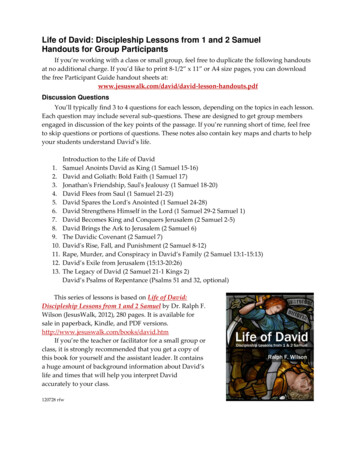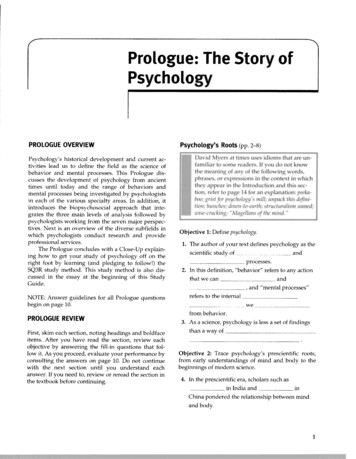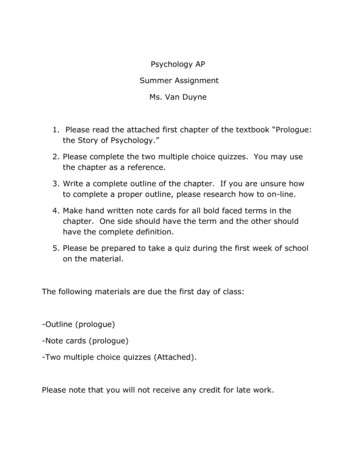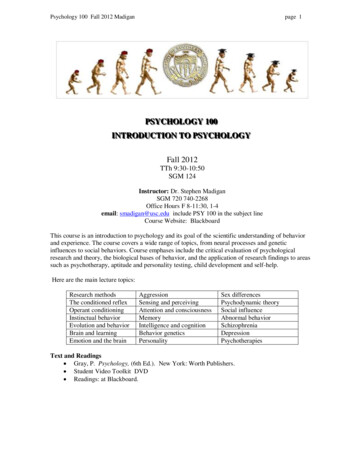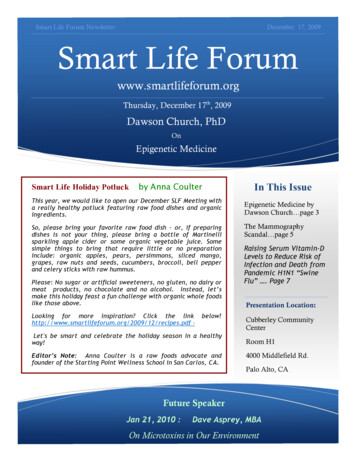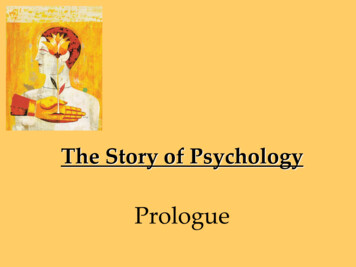
Transcription
The Story of PsychologyPrologue
Psychology – the science of behavior andmental processes Behavior - is anything an organism does.(recordable/observable) Mental processes - internal, subjectiveexperience we infer from behaviorsensations, perceptions, dreams, thoughtsbeliefs, and feelings.
Psychology’s RootsAristotle (384-322 B.C.)Aristotle, a naturalist and philosopher, theorizedabout psychology’s concepts. He suggested that thesoul and body are not separate and that knowledgegrows from experience.
Psychological Science is BornWundt (1832-1920)Wundt andpsychology’s firstgraduate studentsstudied the “atoms ofthe mind” byconducting experimentsat Leipzig, Germany, in1879. This work isconsidered the birth ofpsychology as we knowit today.
Psychological Science is BornMary CalkinsJames (1842-1910)American philosopher William James wrote animportant 1890 psychology textbook. MaryCalkins, James’s student, became the APA’s firstfemale president.
Psychological Science is BornFreud (1856-1939)Sigmund Freud, an Austrian physician, and hisfollowers emphasized the importance of theunconscious mind and its effects on human behavior.
Psychological Science is BornPsychology originated in manydisciplines and countries. It was,until the 1920s, defined as thescience of mental life.
Development of Psychology(Schools)
Structuralism Goals: To study conscious experienceand its structure Notable Psychologists: Wundt, Titchner Methods: Experiments, introspection Application: “Pure scientific research”– Spurred development of psychologicallaboratories
Wilhelm Wundt (1832–1920)
A Stimulus for Introspection Can youdescribethis figure?
Functionalism Goals: To study how the mind works toallow an organism to adapt to itsenvironment Notable Psychologists: James, Cattell,Thorndike, Dewey Methods: Naturalistic observations ofanimal and human behavior Applications: Child psychology;educational and industrial psychology;study of individual differences
Gestalt Psychology Goals: To describe organization of mentalprocesses– “The whole is greater than the sum of itsparts.” Notable Psychologists: Wertheimer,Koffka, Kohler Methods: Observation ofsensory/perceptual phenomena Applications: Understanding of visualillusions, laid some groundwork forhumanistic and cognitive psychology
Psychoanalysis Goals: To explain personality andbehavior and develop techniques fortreating mental illness Notable Psychologists: Freud, Jung,Adler Methods: Free association underguidance of analyst; clinical insight Applications: Development ofpsychotherapy; emphasis on childhood asimportant in later personality
Behaviorism Goals: To study only observable behaviorand explain behavior via learningprinciples Notable Psychologists: Watson, Skinner Methods: Observation of the relationshipbetween environmental stimuli andbehavioral responses Application: Behavior modification;improved teaching methods
Approaches to the Scienceof Psychology Biological Approach– Emphasizes activity of the nervous system,especially the brain, the action of hormonesand other chemicals, and genetics
Approaches to the Scienceof Psychology (cont) Evolutionary Approach– Emphasizes the ways in which behavior andmental processes are adaptive for survival
Approaches to the Scienceof Psychology (cont.) Psychodynamic Approach– Emphasizes internal conflicts, mostlyunconscious, which usually pit sexual oraggressive instincts against environmentalobstacles to their expression
Approaches to the Scienceof Psychology (cont.) Behavioral Approach– Emphasizes learning, especially eachperson’s experience with rewards andpunishments Cognitive Approach– Emphasizes mechanisms through whichpeople receive, store, retrieve, and otherwiseprocess information
Approaches to the Scienceof Psychology (cont.) Cognitive Approach– Emphasizes mechanisms through whichpeople receive, store, retrieve, and otherwiseprocess information
Approaches to the Scienceof Psychology (cont.) Humanistic Approach– Emphasizes individual potential for growthand the role of unique perceptions in guidingbehavior and mental processes
Psychological Science DevelopsWatson (1878-1958)Watson and later Skinneremphasized the study of overtbehavior as the subject matter ofscientific psychology.Skinner (1904-1990)Behaviorists
Psychological Science DevelopsRogers (1902-1987)Maslow (1908-1970)Humanistic PsychologyMaslow and Rogers emphasized currentenvironmental influences on our growthpotential and our need for love andacceptance.
Psychology TodayWe define psychology today as the scientificstudy of behavior (what we do) and mentalprocesses (inner thoughts and feelings).
Human Diversity and Psychology Are all people essentially the same? Sociocultural factors shape people’sexperiences and what they learn fromthem– e.g., social identity, gender, ethnicity, socialclass, and culture– These variables can lead to many significantdifferences in behavior and mentalprocesses, especially across cultures
Some Characteristics Typical ofIndividualist versus Collectivist Cultures Personal Identity– Individualist: Separate from others– Collectivist: Connected to others Major Goals– Individualist: Self defined; be unique,realize your potential, compete with others– Collectivist: Defined by others, belong,occupy your proper place, meet yourobligations to others, be like others
Some Characteristics Typical ofIndividualist versus CollectivistCultures Criteria for SelfEsteem– Individualist: Abilityto express uniqueaspects of the self, beself-assured– Collectivist: Ability torestrain the self and bepart of a social unit,ability to be selfeffacing
Some Characteristics Typical ofIndividualist versus CollectivistCultures Sources of Success and Failure– Individualist: Success comes from personaleffort; failure from external factors– Collectivist: Success due to help fromothers, failure due to personal faults Major Frame of Reference– Individualist: Personal attitudes, traits, andgoals– Collectivist: Family, work group
Korean or U.S. Advertisements? “She’s got a style allher own”– ANSWER: U.S. “You, only better”– ANSWER: U.S. “A more exhilarating wayto provide for your family”– ANSWER: Korea “We have a way ofbringing people closertogether”– ANSWER: Korea “Celebrating a half-centuryof partnership”– ANSWER: Korea “How to protect the mostpersonal part of theenvironment: Your skin”– ANSWER: U.S. “Our family agrees with thisselection of homefurnishings”– ANSWER: Korea “A leader among leaders”– ANSWER: U.S.
Cultural Diversity in the United States
Psychological Associations & SocietiesThe American Psychological Associationis the largest organization of psychologywith 160,000 members world-wide,followed by the British PsychologicalSociety with 34,000 members.
Contemporary PsychologyPsychology’s Biggest Question?Nature Nurture Issue (controversy overthe relative contributions of biology andexperience.)
Psychology’s Three Main Levels ofAnalysis123
Psychology’s Current PerspectivesPerspectiveFocusSample QuestionsNeuroscienceHow the body and brainenables emotions?How are messagestransmitted in the body? Howis blood chemistry linked withmoods and motives?EvolutionaryHow the natural selectionof traits the promotes theperpetuation of one’sgenes?How does evolution influencebehavior tendencies?Behavior genetics How much our genes andour environmentsinfluence our individualdifferences?To what extent arepsychological traits such asintelligence, personality,sexual orientation, andvulnerability to depressionattributable to our genes? Toour environment?
Psychology’s Current PerspectivesPerspectiveFocusSample QuestionsPsychodynamicHow behavior springsfrom unconscious drivesand conflicts?How can someone’spersonality traits anddisorders be explained interms of sexual andaggressive drives or asdisguised effects of unfulfilledwishes and childhoodtraumas?BehavioralHow we learn observableresponses?How do we learn to fearparticular objects orsituations? What is the mosteffective way to alter ourbehavior, say to lose weight orquit smoking?
Psychology’s Current PerspectivesPerspectiveFocusSample QuestionsCognitiveHow we encode, process,store and retrieveinformation?How do we use informationin remembering? Reasoning?Problem solving?Social-culturalHow behavior andthinking vary acrosssituations and cultures?How are we — as Africans,Asians, Australians or NorthAmericans – alike as membersof human family? As productsof different environmentalcontexts, how do we differ?
Psychology’s Subfields: vePersonalitySocialWhat she doesExplore the links between brain andmind.Study changing abilities from womb totomb.Study how we perceive, think, and solveproblems.Investigate our persistent traits.Explore how we view and affect oneanother.
Psychology’s Subfields: ResearchOther 4.6%Psychometrics5.5%Cognitive8.0%Social 21.6%Personality4.8%Data: APA 1997
Psychology’s Subfields: AppliedPsychologistClinicalWhat she doesStudies, assesses, and treats people withpsychological disordersCounselingHelps people cope with academic,vocational, and marital challenges.EducationalStudies and helps individuals in schooland educational settingsIndustrial/OrganizationalStudies and advises on behavior in theworkplace.
Psychology’s Subfields: 5%Clinical67%Data: APA 1997
Clinical Psychology vs. PsychiatryA clinical psychologist (Ph.D.) studies, assesses,and treats troubled people with psychotherapy.Psychiatrists on the other hand are medicalprofessionals (M.D.) who use treatments like drugsand psychotherapy to treat psychologicallydiseased patients.
Psychology’s Roots Aristotle (384-322 B.C.) Aristotle, a naturalist and philosopher, theorized about psychology’s concepts. He suggested that the soul and body are not separate and that knowledge grows from experience.


